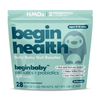Nutrition Tips for Formula-Fed Babies
share this article

Proper nutrition is crucial for the healthy growth and development of little ones, especially during their early months. While breastfeeding is often recommended as the optimal feeding method, formula feeding can also provide essential nutrients for infants. In this blog, we’ll review our top nutrition tips for parents of formula-fed babies to ensure adequate nutrition as they grow.
Importance of Formula Feeding
Formula feeding is a common alternative when breastfeeding is not possible or preferred. Infant formulas are designed to mimic the nutritional composition of breast milk, providing essential nutrients such as proteins, carbohydrates, fats, vitamins, and minerals. It's essential for parents to choose a formula that meets their kiddo's specific nutritional needs and consult with healthcare professionals if unsure.
Daily reads to help your little ones lead happier and healthier lives.
Join the
Happy Gut Club
Nutrition Tips for Formula-Fed Kiddos
-
Selecting the Right Formula: There are various types of infant formulas available, including cow's milk-based, soy-based, hydrolyzed protein, and specialized formulas for specific dietary needs. Research published in the. Journal of Pediatric Gastroenterology and Nutrition suggests that most healthy, term infants can thrive on standard cow's milk-based formulas [1]. However, for infants with specific dietary concerns or allergies, specialized formulas may be recommended.
-
Following Feeding Guidelines: It's essential to follow the recommended feeding guidelines provided by healthcare professionals or as indicated on the formula packaging. Overfeeding or underfeeding can have adverse effects on an infant's health and growth. According to a study in the Journal of the American Academy of Pediatrics, proper feeding practices are crucial for maintaining appropriate growth and development in formula-fed infants [2].
-
Ensuring Proper Hydration: Formula-fed kiddos may need additional water to stay adequately hydrated, especially in hot weather or during illness. However, it's essential not to dilute formula with too much water, as this can lead to inadequate nutrient intake. The American Academy of Pediatrics recommends offering small amounts of water between feedings to prevent dehydration while ensuring the infant receives the necessary nutrients from formula [3].
-
Sterilizing Equipment: Proper cleaning and sterilization of feeding equipment, such as bottles and nipples, are essential to prevent contamination and reduce the risk of infections. Research in the Journal of Hospital Infection emphasizes the importance of maintaining strict hygiene practices to minimize the transmission of harmful bacteria to formula-fed infants [4].
-
Monitoring Growth and Development: Regular monitoring of an infant's growth and development is crucial for assessing nutritional adequacy and overall health. Healthcare professionals often track growth parameters, such as weight, length, and head circumference, to ensure that formula-fed kiddos are thriving. A study in Pediatrics highlights the importance of growth monitoring as a vital component of pediatric healthcare [5].
Summary
Proper nutrition plays a vital role in the healthy development of formula-fed kiddos. Selecting the right formula, following feeding guidelines, ensuring proper hydration, sterilizing feeding equipment, and monitoring growth and development are essential aspects of providing optimal nutrition for formula-fed babies.
















